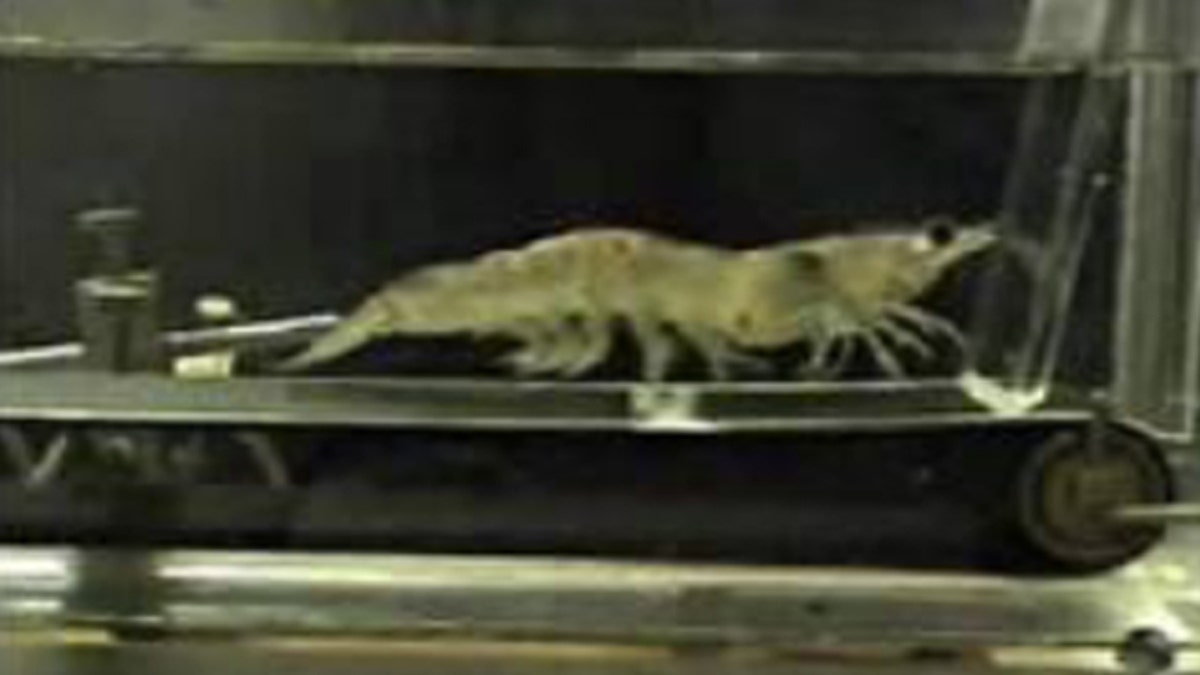
Shown here is a shrimp walking on a treadmill, part of a National Science Foundation-funded research project. (Office of Sen. Tom Coburn)
Scientific studies conducted in the public interest appear to have veered off course, according to a new report that documents government-sponsored research gems such as having shrimp walk on tiny treadmills to measure the impact of sickness on crustaceans.
While the exercises may be adorable to watch, Sen. Tom Coburn says he's not so sure it advances the cause of science.
The Oklahoma Republican issued a new report Thursday that concludes the National Science Foundation has misspent $3 billion on "waste, fraud, duplication and mismanagement." It offers a list of research projects that could have been left as questions for the universe.
Among them, $2 million to analyze 38 million photos on Flickr and cross-reference them against the site's social networking service. Turns out, researchers concluded, that friends generally post photos on the Internet depicting the same place at the same time.
Some other beauties: A $315,000 NSF-funded study on whether playing Facebook's FarmVille can help adults develop relationships; $80,000 to examine why the same teams always end up leading March Madness; and a $1.5 million grant for scientists to design a robot that can fold laundry -- at a rate of one towel every 25 minutes.
Coburn said he's concerned the 50-year-old NSF -- the independent government agency tasked with managing research grants for America's higher education institutions -- may have strayed from its core scientific mission.
"There is no question NSF serves an important -- and legitimate -- purpose in our society and has contributed to scientific discovery," Coburn said in a statement. "Unfortunately, in some ways NSF has undermined its core mission through mismanagement and misplaced priorities."
The foundation, which had a $6.9 billion budget in 2010, vigorously defended itself in a statement released Thursday in response to the study.
The foundation is "renowned for its gold-standard approach to peer review," said Public Affairs Director Dana Topousis, and its discoveries have "advanced the frontiers of science and engineering, improved Americans' lives, and provided the foundations for countless new industries and jobs."
Where the foundation fell short, Topousis said, the organization has tried to police itself.
"While no agency is without flaws, NSF has been diligent about addressing concerns from members of Congress about workforce and grant management issues, and NSF's excellent record of tracking down waste and prosecuting wrongdoing is apparent from Sen. Coburn's report. We believe that no other funding agency in the world comes close to NSF for giving taxpayers the best return on their investment," Topousis said.
Aside from the questionable science, Coburn's report documented numerous instances where the NSF funded potentially illicit behavior.
In one instance, two "romantically involved" workers went on 47 trips during the course of more than two years, at a cost of $144,000 to NSF. Other entities were forced to return hefty grants after misusing the funds on everything from alcohol to video games. The inspector general's office had investigated several of those cases.
The report documented one instance where employees were caught Jell-O wrestling at NSF's Antarctica research station. The organizer was fired over the incident.
At the same time as Coburn's report, another report released by the Government Accountability Office documented costly duplication of services occurring across the federal government. GAO found that in 2009, the government spent $4 billion on improving teacher quality, without a strategy for reducing overlap. The study found 47 federal programs for employment and training, with 44 of them overlapping with "at least one other program."
Similarly, Coburn's report claimed the NSF was duplicating the work of several other government agencies dedicated to research and development.
The report recommends new guidelines for what constitutes a worthy study. It also calls for the elimination of the foundation's social sciences arm and a mandate that NSF use its funding or return it. The report said NSF sat on $1.7 billion worth of unspent funds located in "expired" grant accounts.











































